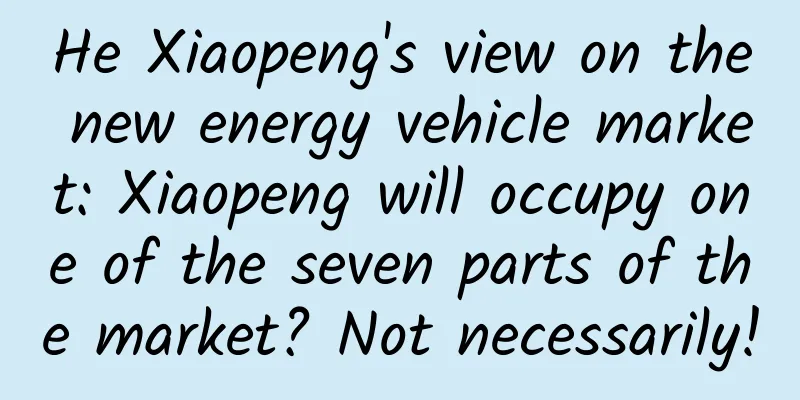He Xiaopeng's view on the new energy vehicle market: Xiaopeng will occupy one of the seven parts of the market? Not necessarily!

|
At the "10 Years of Passion Night" press conference, He Xiaopeng, chairman of Xpeng Motors, asserted that in ten years, there may only be seven mainstream Chinese auto brands left. Ten years is not a long time. There are many Chinese and foreign auto brands active in the Chinese market. It is unlikely that the number will be reduced to seven mainstream brands within ten years. Volkswagen, Mercedes-Benz, BMW, Audi, Toyota, Honda, Porsche and others do not seem to be able to survive for ten years. However, there is still a certain possibility that the number of domestic brands will be reduced to 7. In the next decade, as the technological gap between domestic manufacturers narrows, it will not be surprising that smaller car brands will be acquired or squeezed out of the mainstream market. The survival probability of many brands will definitely be lower than it is now. So, let’s follow He Xiaopeng’s line of thought and make a bold guess: ten years later, which seven domestic brands are most likely to remain in the mainstream market? First, there are various state-owned “autos”, such as FAW, SAIC, BAIC, Dongfeng, Changan, GAC, JAC, etc.; Secondly, traditional independent brands, mainly BYD, Great Wall, Chery, and Geely; Finally, there are new car-making forces like Xiaopeng, mainly including NIO, Ideal, Nezha, Leapmotor, Xiaomi and various "jies" under Hongmeng Intelligent Driving. With so many car brands, the market is bound to streamline them. A mature car market does not really need so many brands, because the automobile industry is an industry that emphasizes economies of scale. The lack of industrial concentration often means weak overall competitiveness. So, based on He Xiaopeng's argument, let's make a bold guess: ten years later, which brands will continue to remain in the mainstream market, and which brands will wave goodbye to us? Let’s first look at the various large state-owned manufacturers. Manufacturers such as FAW, SAIC, and Dongfeng are very powerful, and the possibility of them withdrawing from the mainstream market within ten years is almost zero. But it should be noted that the market performance of these large state-owned companies is also uneven, and most of them are highly dependent on joint venture businesses, which may be the biggest variable in the next decade. Take SAIC Group as an example. In July 2024, SAIC Group's vehicle sales reached 251,484 units, a year-on-year decrease of 37.16%. The main reason was the collapse of the joint venture business. SAIC Volkswagen fell 18.18% and SAIC General Motors plummeted 82.42%. The same is true for GAC Group. In July 2024, GAC Group's sales were 141,196 vehicles, a year-on-year decrease of 25.37%. From January to July, it fell by 25.83% year-on-year. The main reason for the decline was the continuous decline in joint venture business. From January to July, GAC Honda fell by 27.34% year-on-year, and GAC Toyota fell by 25.48% year-on-year. Therefore, whether the large state-owned enterprises can stay in the mainstream market in the next decade depends on the development of joint venture businesses; if manufacturers such as Volkswagen and Toyota successfully turn around, then these manufacturers may continue to prosper; if foreign partners continue to be sluggish or even withdraw from the Chinese market, they will also decline accordingly. If the second scenario occurs, several state-owned manufacturers may even undergo a new round of mergers and reorganizations, and eventually only two established manufacturers, FAW and SAIC, will remain. This is not impossible, as the current SAIC Group was formed when SAIC and Nanjing Automobile merged. In terms of privately owned brands, there are currently the "Four Heavenly Kings" of BYD, Geely, Great Wall, and Chery. BYD has been the global sales champion of new energy vehicles for two consecutive years, and it has various core technologies in hand. It is highly likely that it will still lead the industry ten years later. Geely's overall scale is smaller than BYD, but its R&D capabilities, product layout and core technologies are also relatively solid, and it will still be a mainstream brand ten years later. Chery and Great Wall are somewhat different. Currently, half of Chery's sales come from overseas markets, and its performance in new energy is average. In the future, it may become a special case like Transsion mobile phone, with overseas sales as the main focus, while maintaining a firm stance in the domestic market. Great Wall's situation is the most dangerous. Except for tanks and the relatively niche pickup truck business, all other fronts have been completely defeated. Its sales in July were only 91,285 vehicles, a year-on-year decrease of 16.32%. It is the only mainstream independent brand to have a significant decline. In other words, if there is a domestic brand that is squeezed out of the mainstream market ten years later, Great Wall is most likely to be the one. Next are the new forces in car manufacturing. In fact, none of the current new forces in car manufacturing are very stable. Ideal and Wenjie have achieved profitability and formed a "duopoly" structure in terms of sales, but the former is too dependent on extended-range electric vehicles and medium-to-large household SUVs, which poses certain risks, while the latter is too deeply tied to Huawei, and its autonomy is questionable. NIO, Xpeng, Leapmotor, Nezha, and Xiaomi are all still in the loss-making stage. NIO is still burning money. The monthly sales of Xpeng, Nezha, and Leapmotor are hovering around 10,000 vehicles. Xiaomi is still in its infancy. These brands all face certain risks. Relatively speaking, Ideal, which has already formed scale advantages, NIO, which has the special label of "battery swapping", and Xiaomi Auto, which is supported by Xiaomi Group, are the new force brands most likely to remain in the mainstream market. If we had to choose seven mainstream brands for the next decade from so many brands, a bold guess would be that FAW, SAIC, BYD, Geely, Ideal, NIO, and Xiaomi are the most likely ones. This speculation may make He Xiaopeng's defenses go off. He believes that there will be 7 mainstream domestic brands in the next ten years, and he assumes that Xiaopeng will be among them. But in fact, whether from the perspective of sales or core competitiveness, the probability of Xiaopeng Motors continuing to stay in the mainstream market in the next ten years is not high. It is now the end of August 2024. Xpeng Motors has sold over 10,000 vehicles for three consecutive months. As early as September 2021, it had become the first new car-making force with monthly sales of over 10,000 vehicles. However, three years later, it has gone back to the starting point. Given the degree of involution in China's new energy market, it is quite difficult for car manufacturers of the size of Xiaopeng to continue to stay in the mainstream market. More importantly, Xiaopeng Motors has not formed a truly unique selling point or established its own moat. In the "scale-based" automobile market, it is easy for it to be abandoned by the market due to cost and delivery speed. Of course, everything is possible. Given Volkswagen's enthusiasm for Xiaopeng, it is not impossible for it to directly acquire Xiaopeng in the future. Becoming a sub-brand of Volkswagen is not the worst outcome. Ten years from now, which seven car manufacturers do you think will be able to continue to compete in the Chinese auto market? As a winner of Toutiao's Qingyun Plan and Baijiahao's Bai+ Plan, the 2019 Baidu Digital Author of the Year, the Baijiahao's Most Popular Author in the Technology Field, the 2019 Sogou Technology and Culture Author, and the 2021 Baijiahao Quarterly Influential Creator, he has won many awards, including the 2013 Sohu Best Industry Media Person, the 2015 China New Media Entrepreneurship Competition Beijing Third Place, the 2015 Guangmang Experience Award, the 2015 China New Media Entrepreneurship Competition Finals Third Place, and the 2018 Baidu Dynamic Annual Powerful Celebrity. |
Recommend
How can an APP quickly build a push operation system?
The Internet population dividend has completely b...
Targeting 48% of quality youth, VIDAA has a different view on the Internet TV landscape
LeTV, Xiaomi, WeTV, PPTV, Kanshang, Fengxing TV, ...
User growth fission guide!
Fission is a standard feature for user growth and...
How much does it cost to create a course mini app in Hangzhou?
The factors affecting the quotation of Hangzhou c...
Bright blue iPhone 7 stunning unboxing in China: third-party customized luxury packaging
Apple has spent a lot of effort on the iPhone 7, n...
How to write the copy for Qingming Festival?
When we think of Qingming What other associations...
If you want to make smart hardware, listen to these four pieces of advice
[[131781]] In recent years, Sinovation Ventures h...
Unlocking hydrogen innovation: towards a sustainable future
Hydrogen energy innovation will set off a green r...
Guide for the National Day holiday, Youji uses VR to give you a different kind of fun
2016 can be called the first year of VR. With onl...
Microbes: Look, I’m generating electricity
Microbial electrochemistry is an emerging field t...
Love life and prevent suicide, what can we do?
Follow "Body Code Decoding Bureau" (pub...
What are the techniques for search bidding mobile promotion? Here are 8 suggestions for you
What are the techniques for search bidding mobile...
Review: How to effectively build a user incentive system!
A product will go through four stages: seed stage...
Ahua Pet Group Training July 2021 iPad Illustration Course [HD with Brush Materials]
Course Catalog Brushes and Materials 18. Elf Hams...
How to set up an account for SEM bidding?
Today, I will share with you how a novice can bui...









